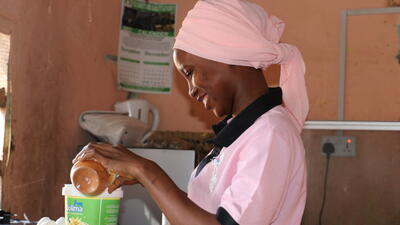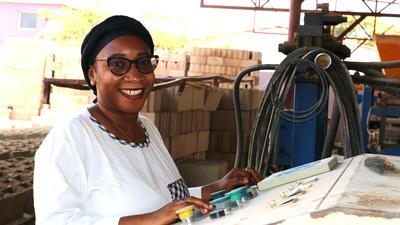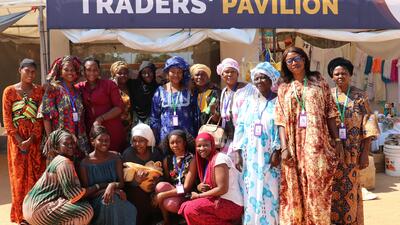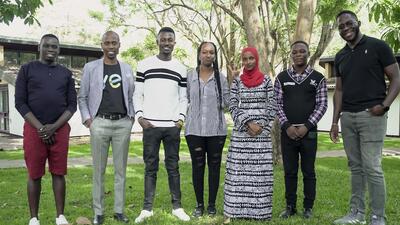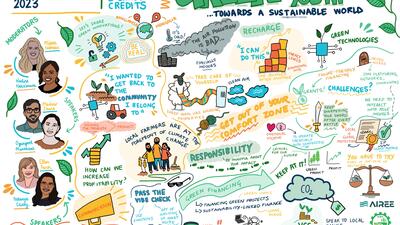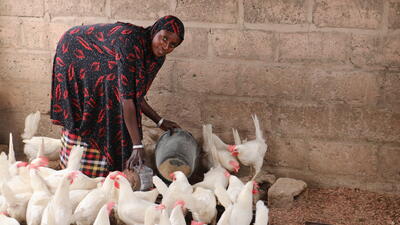ITC, SDF launch Mini-Loans Scheme for young Gambian entrepreneurs
Access to finance initiative to offer loan products youth-led micro, small and medium sized enterprises (MSMEs) in the Gambia.
(Banjul) – The International Trade Centre’s (ITC) Gambia Youth Empowerment Project (YEP) and the Social Development Fund (SDF), a non-profit organization, today announced the launch of the Mini-Loans Scheme, which will increase access to finance for youth-led micro, small and medium sized enterprises (MSMEs) in The Gambia.
Through this new, joint initiative YEP and SDF will offer loan products with a reduced level of collateral and interest rates to young entrepreneurs across the Gambia. This scheme complements other components of the YEP, such as trainings, market linkages and the mini-grant scheme already in place for grass-roots entrepreneurs.
‘This initiative will increase access to finance for young entrepreneurs currently not eligible or not able to access bank credit,’ said SDF Director-General Sonko Fofana. He added. ‘Following an international competitive procurement process, the SDF signed a partnership agreement with YEP for the implementation of the Mini-Loans Scheme.’
YEP Project Manager Raimund Moser highlighted the importance of the scheme for job creation. ‘In the Gambia, access to capital is one of the biggest bottlenecks for youths to set up and grow their businesses,’ he said. ‘The scheme will facilitate access to financing for up to 580 youth-owned enterprises, with the objective to drive growth and create jobs’ he added.
European Union Ambassador to The Gambia Attila Lajos stressed the important role the private sector plays in accelerating inclusive development in The Gambia. ‘The launch of the mini-loan echoes the commitment of the European Union to support innovative ways of finance and to strengthen the private sector-led growth’ he said.
In his launching statement, the Minister of Trade, Industry Regional Integration and Employment, Amadou Sanneh, pointed out that youth empowerment is at the centre of the government’s development agenda as stated in the National Development Plan. He encouraged the youth across the country to take advantage of this opportunity. He also urged the business support institutions, both in the public and private sector ‘to provide the necessary support and guidance to the target beneficiaries particularly in the rural areas to optimally utilise this opportunity and create the much need quality jobs and wealth especially for young Gambians’.
The Mini-Loans Scheme aims at facilitating the acquisition of small machinery and equipment, acquisition of new premises, improvement and expanding of existing premises, and working capital for young entrepreneurs desiring to grow their businesses and already established small-scale businesses. The target beneficiaries for the scheme are young entrepreneurs who have successfully completed a course or programme on skills, entrepreneurship or business management. Initially, only youth that benefited from a YEP-funded training programme will be eligible. However, as of 1 January 2019, the scheme will be accepting applications from Gambian youth that have completed skills or entrepreneurship trainings with other institutions.
The average loan amount per beneficiary is GMD 150,000 ($3,000). The amount of financing to a single beneficiary is dependent on the application assessment and business plan proposed, but will not exceed GMD 480,000 ($10,000). The loan term will be a maximum period of 12 months and a minimum period of 6 months per loan cycle. A maximum annual interest rate of 10% be applied.
Notes for the Editor
About YEP - The Gambia Youth Empowerment Project (YEP) is a four-year project that aims to supporting youth employment and entrepreneurship in the country to address the economic root causes of irregular migration. It is funded by the European Union (EU) Emergency Trust Fund for Africa with a total budget of EUR 11 million. By improving the employability of youth, especially potential and returning migrants, increasing income opportunities along value chains and helping young entrepreneurs to connect to trade and tap into the digital economy, this project aims to change the current migration trends and contribute to building the long-term growth and economic competitiveness of The Gambia.
About ITC - The International Trade Centre is the joint agency of the World Trade Organization and the United Nations. ITC assists small and medium-sized enterprises in developing and transition economies to become more competitive in global markets, thereby contributing to sustainable economic development within the frameworks of the Aid-for-Trade agenda and the United Nations’ Sustainable Development Goals.
For more information, visit www.intracen.org.
About the EU Trust Fund - The European Union’s Emergency Trust Fund for Africa addresses the root causes of irregular migration and displaced persons in Africa. More specifically, it helps address the root causes of destabilisation, forced displacement and irregular migration by promoting economic and equal opportunities, strengthening security, development and resilience of vulnerable people.
For more information, visit https://ec.europa.eu/trustfundforafrica/
About the Social Development Fund - The Social Development Fund (SDF) was established in 1998 under the African Development Bank funded Poverty Reduction Project (PRP), and subsequently registered as a Trust Company. The SDF mobilises resources and manages funds in trust for and on behalf of the Government and donors to facilitate access to credit for supporting MSME operations in all sectors of the economy





